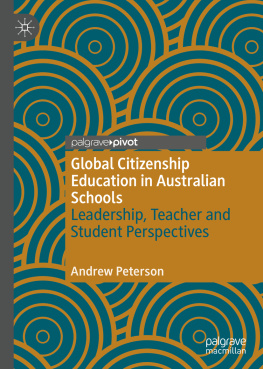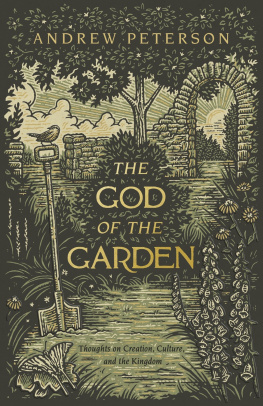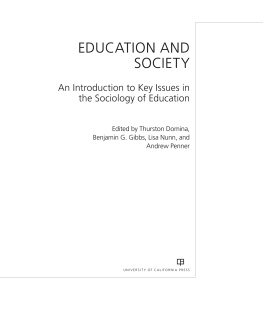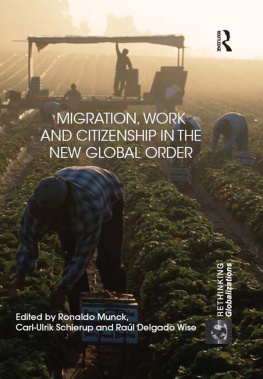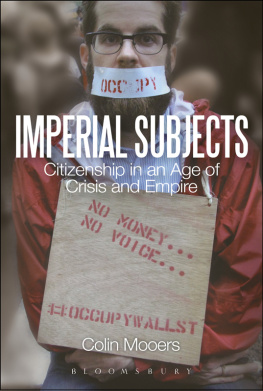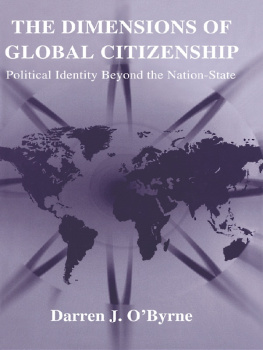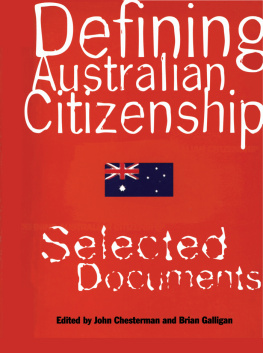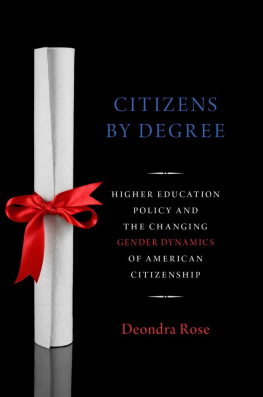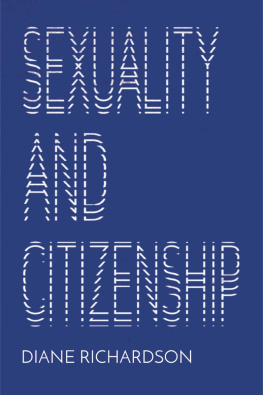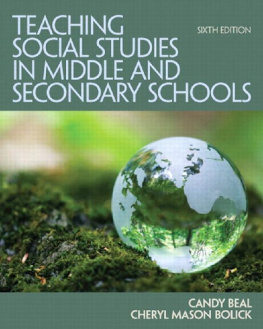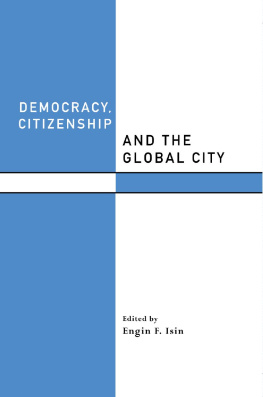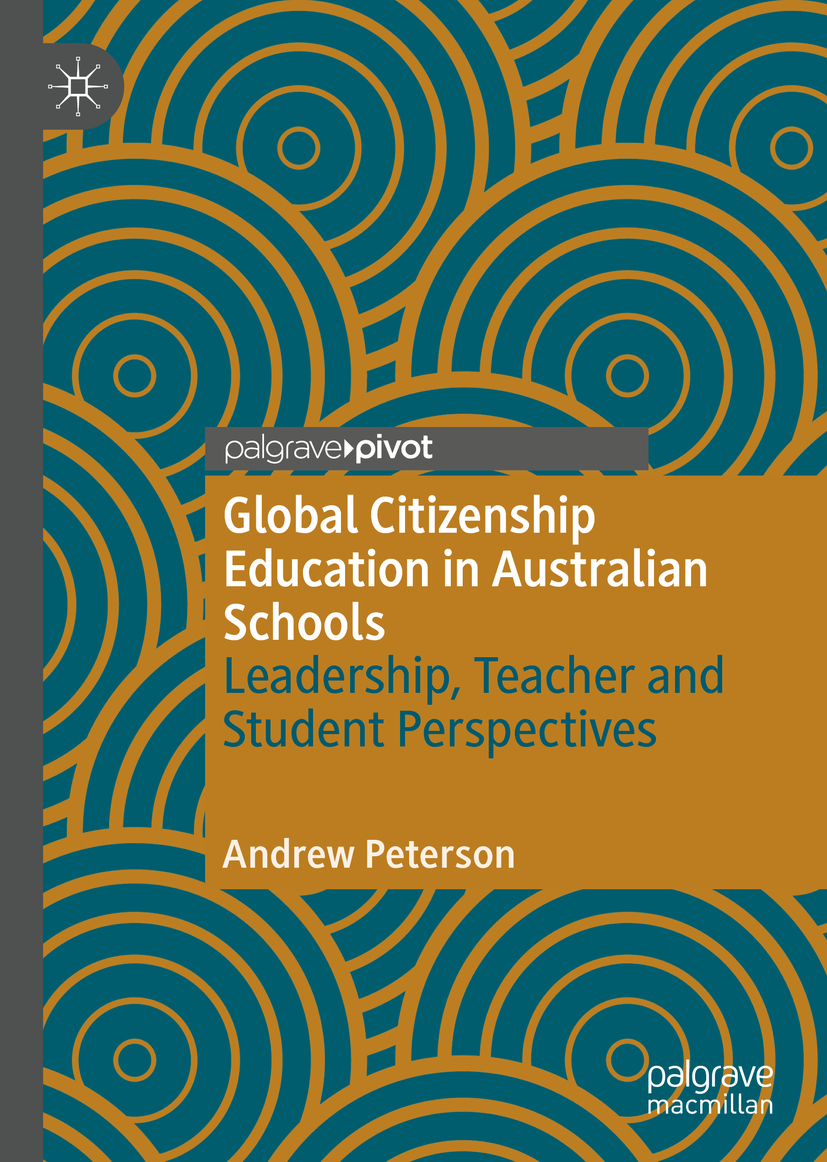Andrew Peterson
Global Citizenship Education in Australian Schools
Leadership, Teacher and Student Perspectives
1st ed. 2020
Andrew Peterson
Jubilee Centre for Character and Virtues, University of Birmingham, Birmingham, UK
ISBN 978-3-030-56602-9 e-ISBN 978-3-030-56603-6
https://doi.org/10.1007/978-3-030-56603-6
The Editor(s) (if applicable) and The Author(s), under exclusive license to Springer Nature Switzerland AG 2020
This work is subject to copyright. All rights are solely and exclusively licensed by the Publisher, whether the whole or part of the material is concerned, specifically the rights of translation, reprinting, reuse of illustrations, recitation, broadcasting, reproduction on microfilms or in any other physical way, and transmission or information storage and retrieval, electronic adaptation, computer software, or by similar or dissimilar methodology now known or hereafter developed.
The use of general descriptive names, registered names, trademarks, service marks, etc. in this publication does not imply, even in the absence of a specific statement, that such names are exempt from the relevant protective laws and regulations and therefore free for general use.
The publisher, the authors and the editors are safe to assume that the advice and information in this book are believed to be true and accurate at the date of publication. Neither the publisher nor the authors or the editors give a warranty, expressed or implied, with respect to the material contained herein or for any errors or omissions that may have been made. The publisher remains neutral with regard to jurisdictional claims in published maps and institutional affiliations.
Cover Pattern John Rawsterne / patternhead.com
This Palgrave Pivot imprint is published by the registered company Springer Nature Switzerland AG.
The registered company address is: Gewerbestrasse 11, 6330 Cham, Switzerland
For Tanya, Darren, Mitch and Tom
For Lyn and Jack
In gratitude for your much valued friendship
Acknowledgements
This book has, for a number of reasons, taken a long time to write. I owe thanks to a range of people and organisations, without whom this book would not have been possible. The research reported in this book was made possible by funding from an Australian Research Council grant (DE150100926) undertaken in 2015, and I thank them for their support. I am, of course, forever appreciative to the principals, teachers, students and other colleagues who participated in the research project and who so willingly gave their views.
At the time of the grant and the collection of data, I was employed by the University of South Australiawhere I remain Adjunct Professor of Education. Two research fellowsAnne Morrison and Nayia Cominossupported my research endeavours during this time and I am indebted to them for doing so. During my time at the university I was fortunate to work with a host of friendly and inspiring colleagues, many of whom shared my interest in global citizenship and citizenship education more widely. Among these colleagues were Brendan Bentley, Greg Bowyer, David Caldwell, Jenni Carter, Jill Colton, Judy Gill, Deb Green, Rob Hattam, Kathy Paige, Alan Reid, Hannah Soong and Garth Stahl.
Turning to the manuscript itself, I am grateful to the critical comments and feedback received from Ian Davies, Laura DOlimpio, Ralph Leighton and the anonymous reviewer commissioned by the publisher. The comments were focused, helpful and made me think about both the data and the analysis in important ways.
Eleanor Christie and Rebecca Wyde at Palgrave have, as always, been supportive and patient, and I am thankful to them for their help.
Finally, and as always, my thanks and love to Jessica, Oliver and George. Though we were not in the same hemisphere when I was collecting the data for this book, and although our Australian adventure was cut short, I remain forever blessed to have your support, love and laughter in my life.
Contents
List of Tables
The Author(s) 2020
A. Peterson Global Citizenship Education in Australian Schools https://doi.org/10.1007/978-3-030-56603-6_1
1. Introduction
Andrew Peterson
(1)
Jubilee Centre for Character and Virtues, University of Birmingham, Birmingham, UK
Abstract
This introduction establishes the focus of the book on global citizenship and education in Australian secondary schools. It does so by, first, providing a brief context of global citizenship education both globally and in Australia in order to situate the analysis offered in the chapters that follow, arguing thatas with other countriesglobal citizenship education stands as an important general goal of education and schooling, but that this does not necessarily translate into widespread and effective practice in schools. The chapter then proceeds to set out key details of the empirical study on which the book is based setting out the aims, research questions, methods, sample and participants of a project investigating approaches to global citizenship education in 6 Australian secondary schools. The chapter also lays out the structure of the book, situating the books aims in the context of a still limited body of research literature on how school leaders, teachers and students understand, implement and experience global citizenship education.
Keywords
Global citizenship education Australia Schools Interviews Focus groups
Similar to its parent concept global citizenship , global citizenship education represents something of an enigma to the extent to which the term is now fairly ubiquitous within academic discourse yet defies clear, precise andperhaps more importantlyconsistent definition. Global citizenship education , for example, lacks clear disciplinary boundaries, and is permeated by themes such as peace education , human rights education , education for sustainable development , social justice education, education for cultural diversity and futures education. Not only do these terms fall within global citizenship education but some of them, such as peace education , human rights education and education for sustainable development , are identifiable and similarly contested fields in their own rights. In general terms, global citizenship education is posited as crucial for ensuring that students understand a wide range of global trends that impact upon themselves and upon others. These trends include technological developments, increased migration, food security/insecurity, the existence and prevalence of diseases (pandemic, or otherwise), transnational political organisations, multinational corporations, globalised financial systems and institutions, fair and free trade and international terrorism. Furthermore, central to most formulations of global citizenship education is the belief that students need to develop what has generally been termed a global consciousness , perceiving themselves as citizens of the world and learning the requisite capacities to participate actively in global(ised) communities. Furthermore, and as the discussion in Chap. examines, global citizenship education can be conceptualised from a range of theoretical positions and as serving various ends.

